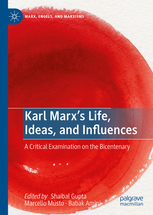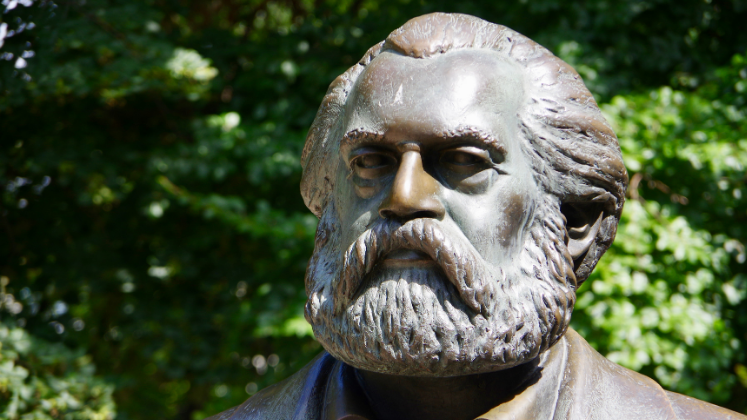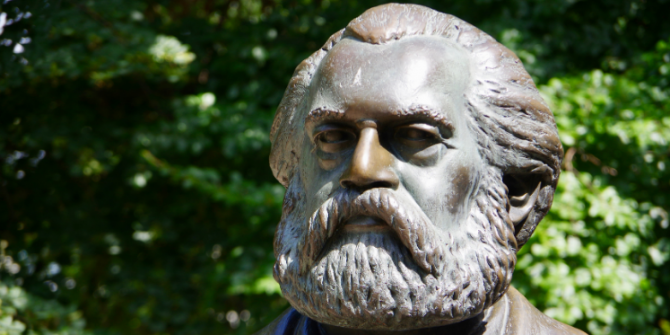In Karl Marx’s Life, Ideas, and Influences, editors Shaibal Gupta, Marcello Musto and Babak Amini bring together contributors to commemorate the 200th anniversary of Marx’s birth and to discuss the relevance of his theoretical and political legacy today. The book offers an open-minded, informative and thought-provoking collection of contributions that inspires in-depth discussions not only of past Marxian and Marxist legacies, but also of how we learn from them to act upon our present and future world, writes Janaína de Faria.
Karl Marx’s Life, Ideas, and Influences: A Critical Examination on the Bicentenary. Shaibal Gupta, Marcello Musto and Babak Amini (eds). Palgrave Macmillan. 2019.
 Karl Marx’s Life, Ideas, and Influences, edited by Shaibal Gupta, Marcello Musto and Babak Amini, brings together a selection of high-quality papers that were presented at one of the largest international conferences organised in 2018 to commemorate the 200th anniversary of Marx’s birth and to discuss the relevance of his theoretical and political legacy to today’s world.
Karl Marx’s Life, Ideas, and Influences, edited by Shaibal Gupta, Marcello Musto and Babak Amini, brings together a selection of high-quality papers that were presented at one of the largest international conferences organised in 2018 to commemorate the 200th anniversary of Marx’s birth and to discuss the relevance of his theoretical and political legacy to today’s world.
As a byproduct of the international diversity of the participants of the conference – held at the Asian Development Research Institute in Patna, India – the book contains sixteen chapters by scholars from and/or based in various parts of the globe and it includes four women among its contributors. This deliberately internationalist approach is undoubtedly welcome and necessary. More fundamentally, it is not a mere formality: the editors do justice to this internationalism in showcasing the heterogeneous nature of the revival of Marxism in the 21st century around the world. This heterogeneity concerns the wide range of complex topics and styles explored in the book as well as its openness to different and controversial (re)interpretations of Marx and Marxism. While the anti-dogmatic perspective can be considered the stamp mark of the book, readers should not expect it to be an easy read for complete beginners in the broad research field on Marx and Marxism.
The structure of the book was designed with consistency by the editors: the various themes are organised under the intertwined umbrellas of Part One, ‘On the Critique of Politics’, and Part Two, ‘On the Critique of Political Economy’. I found this organisation particularly clever because it directly alludes to Marx’s early project in 1844 to write a two-volume work on the Critique of Politics and Political Economy. For reasons explained in his famous 1859 ‘Preface’ to A Contribution to the Critique of Political Economy, Marx’s studies led him to instead begin with an in-depth study of Political Economy, which later culminated in his (unfinished) masterpiece Capital.
However, as Michael Krätke has pointed out elsewhere, Marx’s plan to develop a critique of politics was deferred, but never abandoned, throughout his lifetime. In my view, despite all the efforts and advances made in the past 150 years or so to unfold the mediating elements between the inner laws of capital accumulation and national and international politics, this articulation remains one of the core frontiers for categorical development within Marxism. The editors’ structuring of the book is thus not only appropriate when it comes to the content of its chapters, but also reminds us of the need to strengthen the theoretical nexus between the critique of politics and the critique of political economy.

It is in this sense that I share my reflections on the theory of fetishism and the theory of interest that were triggered by the seemingly unconnected chapters by Paula Rauhala and Jan Toporowski, respectively presented in Parts One and Two. Rauhala’s analysis brilliantly articulates different interpretations of Capital from West and East Germany by providing the historical context of each side of the country both in terms of the general living conditions of the working class as well as the (geo)political structure under which they lived. Rauhala is especially interested in counterposing West German readings of Capital that stress Marx’s theory of money and commodity fetishism but are dismissive of the underpinning role of the theory of surplus value in Marx’s more complex concept of capital fetishism. Toporowski, in turn, is spot on when he emphasises that Marx antagonised both classical political economy – mainly David Ricardo, who regarded ‘interest as determined by the current rate of profit’ (225) – as well as French socialist Pierre-Joseph Proudhon, who ‘attributed the evils of capitalism to excessive interest or usury’ (215). For Marx, they both held a fetishistic conception of money and interest.
Rauhala is thus absolutely right when she insists that: ‘fetishism is a crucial concept, and it is present in all three books of Capital. The fetishisms of commodities and money are just the beginning of the story, and after the fourth chapter of the first volume, the concept of fetishism is always related to surplus value and to the mechanisms of its production, circulation, and distribution’ (186). In Chapter Four of the first volume of Capital, one reads that:
capital is money, capital is commodities. In truth, however, value is here the subject of a process in which, while constantly assuming the form in terms of money and commodities, it changes its own magnitude, throws off surplus-value from itself considered as original value, and thus valorises itself independently. […] By virtue of being value, it has acquired the occult ability to add value to itself (Capital, vol. I, Penguin ed. 1990, 255).
Indeed, Marx further argues in the third volume that ‘in interest-bearing capital […] this automatic fetish is elaborated into its pure form, self-valorising value, money that makes (breeds) money, and in this form it no longer bears any marks of its origin. The social relation is consummated in the relationship of a thing (money) to itself’ (Economic Manuscripts of 1864-5 [vol. III], Brill ed. 2016, 492-93).
Toporowski particularly discusses Marx’s argument in Capital that capitalist industrial investments allow for the extraction of surplus value from workers, the source of profits, ‘out of which interest may be paid’ (225). It is thus class exploitation that underpins capitalist interest payment but, in contrast to Ricardo’s position, ‘not necessarily from the surplus value produced at the time of the interest payment’ (219). I do have reservations, nonetheless, about Toporowski’s claim that Marx’s theorisation was limited by his ‘time of ‘’classic capitalism’’’ (225), when productive and commercial capitalists depended primarily on past accumulated monetary hoards for loans, through the intermediation of banks. I find this view overlooks the fact that Marx sketched an analysis of the credit system in the third volume of Capital grounded on his concept of fictitious capital, with a particular focus on banking, share capital and public debt assets. Crucially, he was well aware that banks did not rely, in absolute terms, on accumulated deposits and reserves in order to provide credit money for those who demanded it – a feature of the banking system that is today reinforced by post-Keynesians.
In short, Rauhala’s and Toporowski’s chapters highlight that class exploitation and surplus-value extraction cannot be sidelined – they are at the heart of Marx’s critique of political economy’s trinity formula. Capital indeed culminates in revealing that the capitalist mode of production encompasses a particular mode of distribution that reproduces the illusion that revenues (rent, interest, profit, wages) emerge out of things themselves (land, money, machines, labour) instead of from underlying exploitative social relations. The deep political implications of this involve the predominant liberal fetishistic notions of equality, freedom and fairness, which many Marxists may also fall prey to up until today.
Regarding other notable contributions in the edited collection, Ramaa Vasudevan’s chapter on the state-credit standard particularly caught my attention and inspired me to search for her other works. Ajit Sinha’s chapter is very coherent and elaborates effectively on the discussion of the supposedly logical inconsistency in Marx’s exposition of the transformation of value into prices of production in Capital. He takes the standpoint of the Italian economist Piero Sraffa, but readers would have benefitted from a critical engagement with Fred Moseley’s counterarguments on the topic, developed in his latest book, Money and Totality. Kohei Saito’s chapter effectively clarifies the intertwined relation between the economic and political spheres in Marx’s works, and can be read alongside Musto’s and Amini’s contributions, as they complement each other.
I must also mention that I learnt a lot from Miguel Vedda’s discussion on the ‘elective affinity between dialectical materialism and the tradition of essayism’. Vedda convincingly argues that this affinity – ‘not only as a genre but also, and more importantly, as a method of enquiry and even as an ethical and political stance towards the world’ (4) – can be particularly helpful for grasping ‘the possibilities and the limits of Marxism in Latin America’ (5). Finally, it should be noted that Peter Beilharz’s chapter is very impressive, not only when it comes to its academic content, which focuses on the recent revival of interest in Marx’s works across the globe, but also regarding its creative ‘breakdance’ style.
All in all, the book offers an open-minded, informative and thought-provoking collection of contributions that inspires in-depth discussions not only of past Marxian and Marxist legacies, but also of how we learn from them to act upon our present and future world.
- This article originally appeared at the LSE Review of Books.
- Image Credit: Statue of Karl Marx, Berlin, Germany (David Merrett CC BY 2.0).
Please read our comments policy before commenting.
Note: This article gives the views of the authors, and not the position of USAPP– American Politics and Policy, nor of the London School of Economics.
Shortened URL for this post: https://bit.ly/3qJ9Rf8
About the reviewer
Janaína de Faria – UFVJM- Brazil
Dr. Janaína de Faria is a Lecturer in Political Economy at UFVJM- Brazil. She has recently completed her PhD in International Political Economy at King’s College London-UK. She was granted a Full Doctoral Scholarship Abroad for 2015-2019 by CAPES, a Brazilian-government research funding institution. Her research interests include International Political Economy, History of Economic Thought, Marx and Marxism, Capital and States in the World Economy, Global Finance and US dollar, Technological Change and International Division of Labour.



